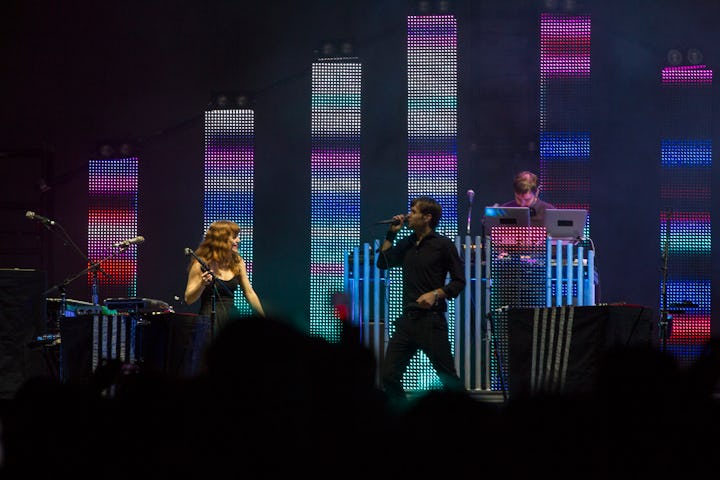20 Years Ago, One Band Released Their Only Album Ever And It Was Perfect
Somehow, it's been two decades since The Postal Service dropped Give Up. Now you’re old!

For a certain demographic, the naughty aughties were a transformative decade for what all agree sounds like “indie rock.” From the rise of Arcade Fire, to The Strokes to TV On the Radio to the Yeah Yeah Yeahs, and even the second wave of Britpop featuring bands like The Arctic Monkeys and Bloc Party, what was once called “alternative” had morphed into something simultaneously more diverse and, also, possessed an accidentally unified aesthetic. Call it twee. Call it whatever you want. The first ten years of the 21st century were a great time for music.
Toward the beginning of this wave was one record everyone had, and became the instant soundtrack to everything you did and everywhere you went. Dropped on February 19, 2003, the one and only album from The Postal Service — Give Up — was the bittersweet angsty sonic manifesto for an entire generation of teens and twentysomethings. Those of us who remember when we weren’t called “old millennials” will have a hard time accepting that two decades have passed since this album dropped. Seems like only yesterday, we were sneaking into secret bars to hang out with Ben Gibbard to smoke some Parliament Lights. Just me?
Postal Service in 2003.
Of course, The Postal Service is not really a band. Ben Gibbard had already established himself as the frontman of Death Cab For Cutie, which had formed in 1997. He’s one half of The Postal Service, with his airy vocals and lyrics sounding very much like many other great Death Cab albums. And yet, Give Up predates Death Cab’s 2003 album Transatlanticism by eight months. Yes, these two Gibbard projects were released the same year, but Give Up isn’t a Death Cab album, any more than Paul McCartney’s Ram is a Beatles album. And that’s because the secret weapon of The Postal Service is Jimmy Tamborello, better known by his DJ stage name, Dntel.
Essentially, Dntel crafted that wonderful electronic sound, while Gibbard wrote the songs. The duo collaborated by snail mail, sending each other burned CDs through the US postal service, hence the name. These back-and-forth music pen pals, added layers to each song through this process, which eventually resulted in the album we got. And, although Gibbard brought in some Death Cab collaborators (like Chris Walla), most people consider the third honorary member of the Postal Service to be Jenny Lewis. At the time, Lewis was best known as the lead singer of the band Rilo Kiley, though that band’s most famous album, More Adventurous, wouldn't be released for another year, in 2004.
However, the memorable duet with Gibbard on the track “Nothing Better,” is sung with Jen Wood, of the band Tattle Tale. It’s tempting to say “Nothing Better” is the best song on Give Up, mostly because it’s certainly the one that’s great live, and has the most unique and creative structure. That said, Jenny Lewis sings on nearly all the other Postal Service tracks, which does make it seem like she’s really in this band.
Track-for-track it’s tough to find a bad song on Give Up. From the opening anthem “The District Sleeps Alone Tonight,” to the mega-famous track “Such Great Heights,” to “Clarke Gable” and “Sleeping In,” each one of these songs gives other Death Cab singles a run for their money. Throughout, the trick of creating catchy upbeat melodies paired with melancholy lyrics works almost every single time. Except for maybe “This Place Is a Prison,” which doesn’t really go anywhere.
The classics on Give Up are so good that when Iron & Wine covered “Such Great Heights,” in 2006, all your hipster friends erroneously believed the Postal Service had stolen the song, rather than the other way around. In 2013, this cover appeared on a 10th-anniversary reissue of Give Up along with The Shins covering “We Will Become Silhouettes.” These covers are great, but neither is near as good as the Postal Service originals.
It’s tempting to say Give Up was a product of its time, and therefore dated. But, if you listen to it now, it feels just as contemporary and slick as it sounded twenty years ago. It’s upbeat enough to avoid being straight-out emo and sophisticated enough to make its genre somewhat undefinable. Twenty years later, any idealistic future has yet to arrive. So, now, there could be nothing better than putting this album on loud, and dancing and crying like you’re twenty-five again.